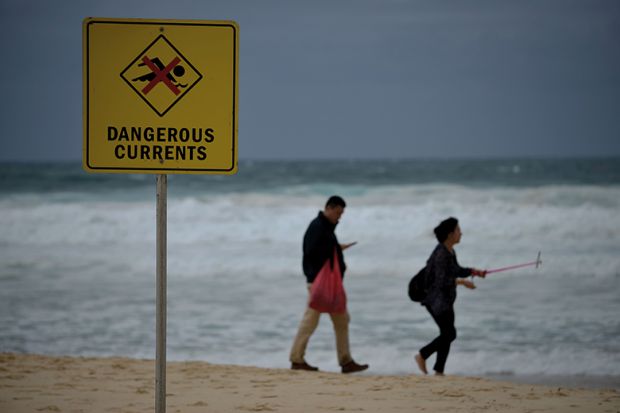The Covid-19 pandemic is raising fundamental questions about the way universities are funded and staffed in countries with more marketised higher education systems, expert opinion suggests, as institutions desperately seek to shore up their finances.
It comes as evidence grows that staff on short-term and casual contracts are bearing the brunt of attempts by institutions in countries such as the UK, the US and Australia to make cost savings in the face of predictions of a major loss of fee income from international students.
In Australia, the National Tertiary Education Union (NTEU) estimates that the equivalent of 20,000 full-time university jobs, and up to 30,000 on a headcount basis, are jeopardised by the crisis.
New South Wales division secretary Michael Thomson said people in casual and fixed-term employment would bear the brunt of the job losses, with the toll reaching thousands at some institutions.
“People in the most insecure employment are going to lose their jobs – people who are on the lowest pay, people with the biggest bills to pay,” he said.
In the UK, there have also been concerns about savings being focused around casual staff and fixed-term contracts, with the prospects for early career researchers particularly highlighted.
Jo Grady, general secretary of the University and College Union, said universities in the country were “powered” by many staff who did not have “proper job security”.
“The crisis has exposed how that system is failing, and we need a fundamental review of the endemic casualisation that props up our sector,” she added.
In the US, independent audits of actions taken by institutions to shore up finances have suggested that cuts to temporary staff are far more common than permanent layoffs, and that general staff are more heavily affected than teaching faculty.
Official federal employment figures, which capture only a portion of those moves, show that US colleges and universities had about 20,000 fewer staff at the end of March than they had at the same time last year, falling to their lowest levels in at least two decades.
Financial data analysed by Times Higher Education also illustrate that some universities in countries that rely heavily on overseas fee income may have little choice other than to cut spending on staff.
In the UK, about one in eight universities had both high levels of reliance on overseas tuition fees (of at least 18 per cent of all income) and spending on staff costs approaching two-thirds of all expenditure (at least 62 per cent) in 2018-19.
The average Australian university, meanwhile, garnered 26.2 per cent of its revenue from international students in 2018, a proportion that rose by an average 0.8 percentage points at the 13 universities that have released 2019 accounts so far. At the same time, the median share of staff costs as a percentage of all expenditure at Australian universities was about 57 per cent in 2018.
Hopes for solutions to protect staff in the short term may rest on the kind of agreement on jobs and pay that has been pursued by the NTEU and some universities in Australia.
In the UK, too, unions and employers have been meeting to discuss a potential way to work together through the crisis, although discussions are still short of any national approach to safeguarding jobs.
Raj Jethwa, chief executive of the Universities and Colleges Employers Association (Ucea), said: “Any decisions regarding highly valued staff are never taken lightly, and employers and unions continue to work together to navigate the workforce challenges created by the pandemic.”
Ucea has disputed claims about growing casualisation in the UK, pointing to figures suggesting that the number of open-ended contracts has been rising more rapidly than that of fixed-term employment contracts.
However, the focus by some universities in the UK, the US and Australia during the pandemic on cutting staff without permanent positions has sparked a wider debate about university employment.
Tian An Wong, a visiting assistant professor at Smith College in Massachusetts, said the crisis was highlighting the “corporatisation and adjunctification of the US academy that has been going on [since] long before the pandemic”.
“The austerity measures currently taking place are already familiar to us from the 2008 [financial] crisis. In many universities and colleges across the US, we see institutions sacrificing their most vulnerable workers while protecting their most highly paid employees.”
Robert Kelchen, associate professor of higher education at Seton Hall University, New Jersey, said that, in the longer term, less-secure positions could even become more common in the US.
“Tenure is increasingly hard to justify to the broader public, and this financial crisis provides the impetus for more universities to move away from that level of job security,” he said.
In the longer term, questions may also be raised about the amount being spent by universities on administration.
Dr Wong said the “ballooning of the administration in academia, which has more than certainly contributed to the exorbitant tuition costs”, was an issue that would have to be revisited in the context of the crisis.
Timothy Devinney, chair and professor of international business at the Alliance Manchester Business School, said “there is little doubt that the big growth in the past decade or more has been bureaucracy and administration”, adding that “universities have piled on so many layers of management and bureaucracy that they have started to run out of titles for people”.
But universities may also face difficult questions in the future about relying so much on international students for their income.
Martine Garland, a lecturer at the Business School at Aberystwyth University, and an expert on financial diversification in UK universities, said: “International students have been seen as the holy grail in terms of recruitment, but that has come back to bite those that have been the most successful.”
POSTSCRIPT:
Print headline: Pandemic highlights insecurity across much of global HE
Register to continue
Why register?
- Registration is free and only takes a moment
- Once registered, you can read 3 articles a month
- Sign up for our newsletter
Subscribe
Or subscribe for unlimited access to:
- Unlimited access to news, views, insights & reviews
- Digital editions
- Digital access to THE’s university and college rankings analysis
Already registered or a current subscriber? Login







